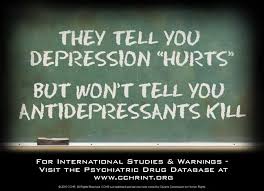What are Anti-Depressants?
Antidepressants are medicines that treat depression. Your doctor can prescribe them for you. They can improve your mood, sleep, appetite and concentration. It may take several weeks for them to help. There are several types of antidepressants. You and your doctor may have to try several before finding what works best for you. Medicines sometimes cause unwanted side effects. For example, when you first start your antidepressant you may feel tired, have trouble sleeping or feel sick to your stomach. The side effects usually go away after a short time. Tell your doctor if you have any side effects. You should also let your doctor know if you take any other medicines, vitamins or herbal supplements.

What are the common signs or symptoms of depression?

Depression is a deep sadness that won't go away. It can also be the loss of interest in doing things you usually enjoy. Common symptoms include:

•Sad, anxious, or "empty" mood that lasts more than 2 weeks.
•Trouble sleeping.
•Appetite changes - either less appetite and weight loss, or eating more and weight gain.
•Loss of interest in doing things you once enjoyed, including sex.
•Feeling restless and cranky.
•Nagging physical symptoms that don't get better with treatment (like chronic pain).
•Trouble paying attention, making decisions, or remembering.
•Feeling tired all the time or like you have no energy.
•Feeling guilty, hopeless, or worthless.
•Thoughts of suicide or death.
Depression is treatable. You can get better. The most common treatments for depression are antidepressant drugs, counselling, or a combination of the two.
New Research-Anti-Depressants May Be Doing More Harm than Good
Be careful when you are using them
Commonly prescribed anti-depressants appear to be doing patients more harm than good, say researchers who have published a paper examining the impact of the medications on the entire body. We need to be much more cautious about the widespread use of these drugs,says Paul Andrews, an evolutionary biologist at McMaster University
It's important because millions of people are prescribed anti-depressants each year, and the conventional wisdom about these drugs is that they're safe and effective.
Andrews and his colleagues examined previous patient studies into the effects of anti-depressants and determined that the benefits of most anti-depressants, even taken at their best, compare poorly to the risks, which include premature death in elderly patients.
Anti-depressants are designed to relieve the symptoms of depression by increasing the levels of serotonin in the brain, where it regulates mood. The vast majority of serotonin that the body produces, though, is used for other purposes, including digestion, forming blood clots at wound sites, reproduction and development.
What the researchers found is that anti-depressants have negative health effects on all processes normally regulated by serotonin.
The findings include these elevated risks:
- developmental problems in infants
- problems with sexual stimulation and function and sperm development in adults
- digestive problems such as diarrhoea, constipation, indigestion and bloating
- abnormal bleeding and stroke in the elderly
The authors reviewed three recent studies showing that elderly anti-depressant users are more likely to die than non-users, even after taking other important variables into account. The higher death rates indicate that the overall effect of these drugs on the body is more harmful than beneficial. Serotonin is an ancient chemical. It's intimately regulating many different processes, and when you interfere with these things you can expect, from an evolutionary perspective, that it's going to cause some harm, Andrews says. Millions of people are prescribed anti-depressants every year, and while the conclusions may seem surprising, Andrews says much of the evidence has long been apparent and available. The thing that's been missing in the debates about anti-depressants is an overall assessment of all these negative effects relative to their potential beneficial effects, he says. Most of this evidence has been out there for years and nobody has been looking at this basic issue. In previous research, Andrews and his colleagues had questioned the effectiveness of anti-depressants even for their prescribed function, finding that patients were more likely to suffer relapse after going off their medications as their brains worked to re-establish equilibrium.
With even the intended function of anti-depressants in question, Andrews says it is important to look critically at their continuing use.
It could change the way we think about such major pharmaceutical drugs,he says. You've got a minimal benefit, a laundry list of negative effects - some small, some rare and some not so rare. The issue is: does the list of negative effects outweigh the minimal benefit?
(Source- Journal Frontiers in Psychology)
No comments:
Post a Comment